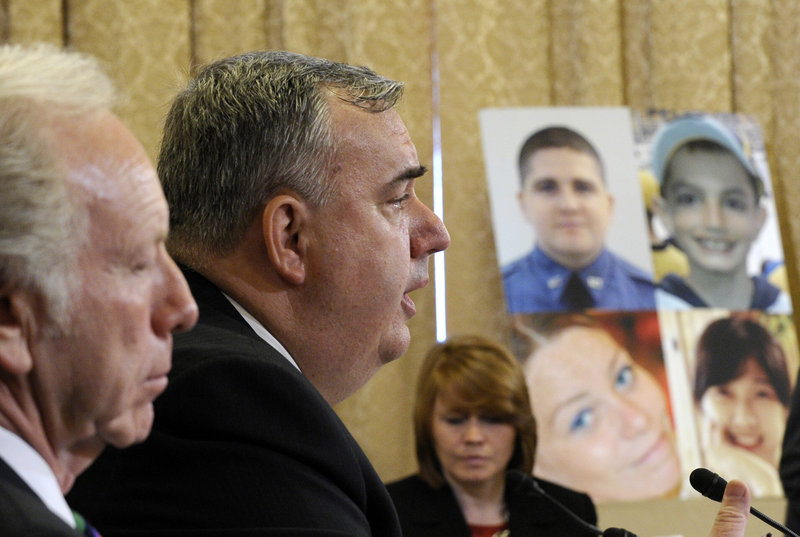WASHINGTON – The FBI did not initially share with Boston police the warnings it had received from Russia about one suspect in last month’s marathon bombings, despite the work of four city police representatives on a federal terrorism task force, Boston’s police commissioner told Congress on Thursday.
Yet Commissioner Ed Davis acknowledged that police might not have uncovered or disrupted the plot even if they had fully investigated the family of Tamerlan Tsarnaev based on those warnings. The FBI after a cursory investigation closed its assessment on Tsarnaev, who died in a police shootout after the bombings. Boston police learned about the Russian security service warnings only later.
“That’s very hard to say. We would certainly look at the information, we would certainly talk to the individual,” Davis said. “From the information I’ve received, the FBI did that, and they closed the case out. I can’t say that I would have come to a different conclusion based upon the information that was known at that particular time.”
Some lawmakers questioned whether Boston police could have more thoroughly investigated Tsarnaev after 2011, based on Russia’s vague warnings then to the FBI and CIA or the discovery by the Homeland Security Department in 2012 that he was traveling to Russia for six months, and whether Justice Department rules intended to protect civil liberties constrained the FBI’s own inquiry.
“Why didn’t they involve the local law enforcers who could have stayed on the case and picked up signals from some of the students who interacted with them, from the people in the mosque,” asked former Sen. Joe Lieberman. “In this case, aggravatingly, you have two of our great homeland security agencies that didn’t involve before the event the local and state authorities that could have helped us prevent the attack.”
Davis’ testimony revealed a gap in information-sharing between federal and local officials. That was somewhat reminiscent of intelligence failures that preceded the 9/11 terror attacks. Unlike those lapses, however, it’s not clear that anything would have been different, whatever coordination there might have been.
Led by the FBI, Joint Terrorism Task Forces operate in many cities as a way to bring federal, state and local officials together to share information. The model has existed for decades but, after 9/11, task forces sprouted up in cities nationwide to ensure that police were not out of the loop on investigations like the one the FBI conducted into Tsarnaev.
Davis said that while his officers weren’t given specific information about the elder Tsarnaev, they did have access to databases maintained by the terrorism task force. Later Thursday, Boston FBI Special Agent in Charge Richard DesLauriers issued a statement detailing how and why representatives from local agencies have access to the databases.
He said giving task force members access to the databases provides necessary “accessibility and awareness that otherwise would be unfeasible” given the volume of such investigations.
Davis said he was not aware of anyone from a local mosque where Tamerlan Tsarnaev once worshipped calling police after photographs of the suspects were released by the FBI. He said authorities also did not hear from classmates of Tsarnaev’s brother, Dzhokhar, at UMass-Dartmouth. Dzhokhar Tsarnaev was captured and faces federal terrorism charges.
The hearing also began laying the groundwork for an expected push for more counterterrorism money. Both Davis and Kurt Schwartz, the Massachusetts homeland security chief, praised federal grants that for years have kept cities flush with money for equipment and manpower.
“People are alive today” because of money for training and equipment, Schwartz said.
In written testimony, Davis told lawmakers that cities should look at deploying more undercover officers and special police units and installing more surveillance cameras — but not at the expense of civil liberties.
“I do not endorse actions that move Boston and our nation into a police state mentality, with surveillance cameras attached to every light pole in the city,” Davis said. “We do not and cannot live in a protective enclosure because of the actions of extremists who seek to disrupt our way of life.”
Investigators used surveillance video from a restaurant near one of the explosions to help identify the Tsarnaev brothers.
Send questions/comments to the editors.



Success. Please wait for the page to reload. If the page does not reload within 5 seconds, please refresh the page.
Enter your email and password to access comments.
Hi, to comment on stories you must . This profile is in addition to your subscription and website login.
Already have a commenting profile? .
Invalid username/password.
Please check your email to confirm and complete your registration.
Only subscribers are eligible to post comments. Please subscribe or login first for digital access. Here’s why.
Use the form below to reset your password. When you've submitted your account email, we will send an email with a reset code.